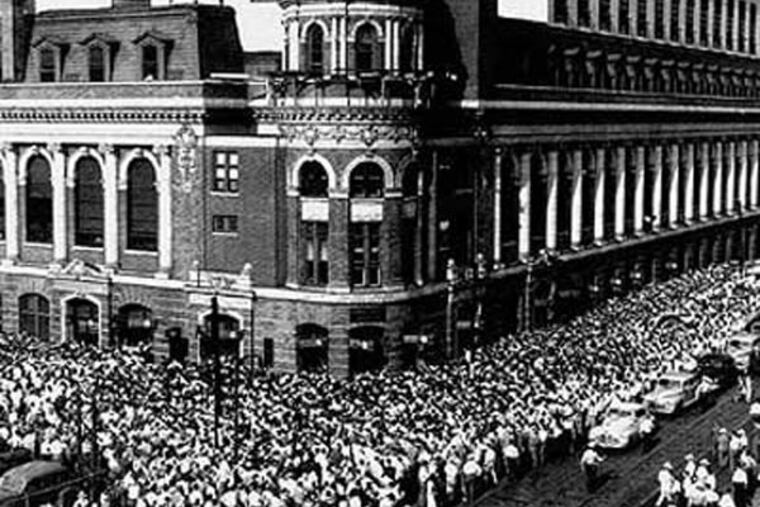The Athletics' last game in Philadelphia
They haven't met very often over the years, but when the Phillies play the Oakland Athletics, a few special memories sometimes surface. That will be the case again this weekend when the two teams meet in Oakland. Friday's game is particularly noteworthy. It's the 60th anniversary of the Athletics' last game in Philadelphia.

They haven't met very often over the years, but when the Phillies play the Oakland Athletics, a few special memories sometimes surface. That will be the case again this weekend when the two teams meet in Oakland. Friday's game is particularly noteworthy. It's the 60th anniversary of the Athletics' last game in Philadelphia.
The Oakland Athletics were, for decades, the Philadelphia Athletics. After playing in Philly for 54 years, starting in 1901 when the American League was formed, the team was moved to Kansas City, where it played for 13 seasons before the franchise was transferred to Oakland.
While in Philadelphia, the Athletics won five championships, more than any other major professional sports team in the city. Overall, they won nine American League pennants, and for much of their stay in Philadelphia they ranked as the city's favorite team.
Some of the greatest players in baseball history played with the A's, including Jimmie Foxx, Eddie Collins, Lefty Grove, Mickey Cochrane, Al Simmons, Frank Baker, and Eddie Plank - all members of the Hall of Fame. In their later years, the A's featured such local favorites as Bobby Shantz, Gus Zernial, Sam Chapman, Ferris Fain, and Elmer Valo.
But the success didn't last. Throughout the 1940s and early 1950s, the A's had finished as high as fourth place only twice, and they had wound up last seven times.
By 1950, when the Phillies won the National League pennant with an enormously popular team called the Whiz Kids, the Athletics were a distant second on the baseball popularity scale.
Like the Phillies, the Athletics played in a decrepit old ballpark that was originally called Shibe Park. The neighborhood was deteriorating, parking was extremely limited, and with a poor team - except for the 1948 and 1952 clubs - attendance had fallen. In 1953, the A's drew just 362,113 fans to their home games.
Longtime owner and manager Connie Mack had retired and handed over the job of running the team to his sons Roy and Earle. But the Athletics were heavily in debt, and it was apparent that they either needed new owners or would fold.
The 1954 season settled the issue. Under new manager Eddie Joost, the former A's shortstop, the Athletics opened the season with a 6-4 win over the Boston Red Sox. They won nine of their first 16 games, but by the end of May had tumbled to a 14-27 record. Soon after, they lost 10 straight games. After an eight-game losing streak in July, their record crashed to 37-75.
Changes were on the horizon when, on Sept. 19, the A's met the New York Yankees at home, in the ballpark that had been renamed Connie Mack Stadium. Although the A's had a 2-0 lead, a four-run eighth inning featuring Gil McDougald's three-run homer gave the Yankees a 4-2 victory. Ironically, Jim Konstanty, the former relief ace of the Phillies, got the save.
Just 1,715 were in attendance to see what would become the Athletics' final game in Philadelphia and the end of an era that had been laced with glittering achievements.
The Athletics finished that season in last place, 60 games out of first place and with a 50-102 record. They posted a home record of just 29-47, drawing only 304,666 fans for the season.
Deep in debt, the team desperately needed a change in ownership. Mayor Joseph S. Clark initiated a campaign called "Save the A's," and a group of local businessmen tried unsuccessfully to buy the team. But, ultimately, the club was sold to Arnold Johnson, a Chicago entrepreneur who paid $1.5 million to the Mack family and picked up the team's $2 million debt.
The team was moved to Kansas City, and then in 1968 to Oakland, where it has won four World Series championships and six American League pennants.
That record, though, was not even imaginable on Sept. 19, 60 years ago, when Philadelphians watched for the last time one of the city's oldest and most storied teams.